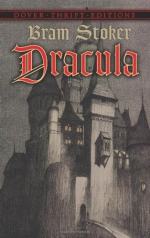As he was speaking there was a soft tapping at the door. I went over and opened it and found in the corridor without, Arthur and Quincey in pajamas and slippers; the former spoke, “I heard your man call up Dr. Van Helsing and tell him of an accident. So I woke Quincey or rather called for him as he was not asleep. Things are moving too quickly and too strangely for sound sleep for any of us these times. I’ve been thinking that tomorrow night will not see things as they have been. We’ll have to look back, and forward a little more than we have done. May we come in?”
I nodded, and held the door open till they had entered, then I closed it again. When Quincey saw the attitude and state of the patient, and noted the horrible pool on the floor, he said softly, “My God! What has happened to him? Poor, poor devil!”
I told him briefly, and added that we expected he would recover consciousness after the operation, for a short time, at all events. He went at once and sat down on the edge of the bed, with Godalming beside him. We all watched in patience.
“We shall wait,” said Van Helsing, “just long enough to fix the best spot for trephining, so that we may most quickly and perfectly remove the blood clot, for it is evident that the haemorrhage is increasing.”
The minutes during which we waited passed with fearful slowness. I had a horrible sinking in my heart, and from Van Helsing’s face I gathered that he felt some fear or apprehension as to what was to come. I dreaded the words Renfield might speak. I was positively afraid to think. But the conviction of what was coming was on me, as I have read of men who have heard the death watch. The poor man’s breathing came in uncertain gasps. Each instant he seemed as though he would open his eyes and speak, but then would follow a prolonged stertorous breath, and he would relapse into a more fixed insensibility. Inured as I was to sick beds and death, this suspense grew and grew upon me. I could almost hear the beating of my own heart, and the blood surging through my temples sounded like blows from a hammer. The silence finally became agonizing. I looked at my companions, one after another, and saw from their flushed faces and damp brows that they were enduring equal torture. There was a nervous suspense over us all, as though overhead some dread bell would peal out powerfully when we should least expect it.
At last there came a time when it was evident that the patient was sinking fast. He might die at any moment. I looked up at the Professor and caught his eyes fixed on mine. His face was sternly set as he spoke, “There is no time to lose. His words may be worth many lives. I have been thinking so, as I stood here. It may be there is a soul at stake! We shall operate just above the ear.”




